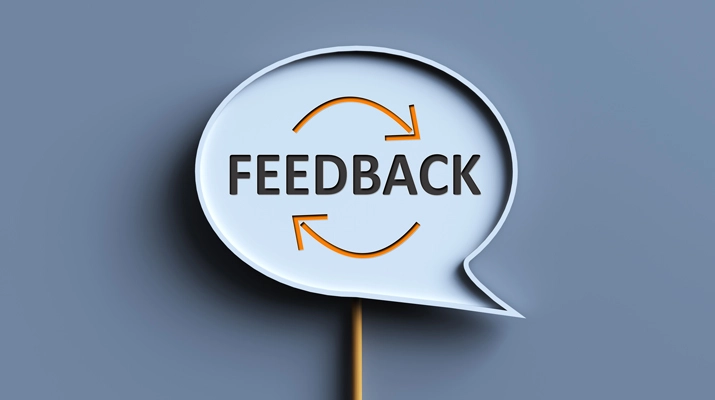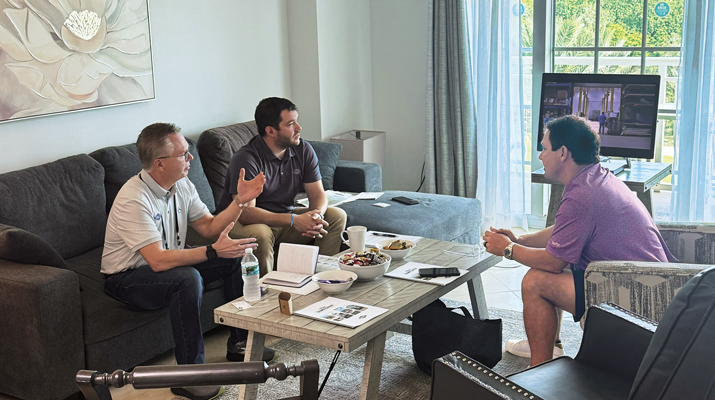How to master the art of receiving feedback
“Feedback is the breakfast of champions!” The legendary Ken Blanchard knew that just as we need fuel to power our day, we need constructive input to perform at our peak. Yet, for most of us, receiving feedback feels more like a bitter medicine than a nourishing meal.

We all receive feedback from time to time from many different people. Are we good at processing feedback and making the most of it? I am going to guess that is not always the case. Processing feedback is complex and goes beyond just hearing what the other person has to say. Receiving feedback requires us to look in the mirror and reflect on how we feel and respond to those giving us feedback.
I read the book “Thanks for the Feedback” by Douglas Stone and Sheila Heen. The text explained that understanding what makes receiving feedback so hard is a powerful tool in your arsenal. The feedback process strikes at the tension between two fundamental human desires – the need to learn and grow, and the need to be accepted just the way you are. When someone offers a critique, even a mild one, it can strike at this conflict, leaving us feeling angry, anxious, disrespected or profoundly threatened. Our emotions are often driven by one of these triggers:

⦁ Truth – This is when you are set off by the content of the feedback. Your internal reaction may be, “This is wrong.” For example, when a husband calls his wife “unfriendly and aloof” at a family event, she might think the accusation is ridiculous and completely inaccurate.
⦁ Relationship – This trigger is tripped by the person giving you the feedback. We often focus on the message (“what”) and not the messenger (“who”). We may dismiss the advice because we question the giver’s credibility, or we feel they lack the right to criticize.
⦁ Identity – This is all about your relationship with yourself. If the feedback causes your sense of who you are to come undone or suggests you’re not as competent or capable as you believe, you can become overwhelmed, defensive or completely off balance.
Learning to manage your triggers is the first step. The following tips help me engage with feedback I receive.
1. Know your tendencies
We have been getting feedback all our lives, and there are likely patterns in how you respond. Do you defend yourself when you question the truth about the content? Argue about how a person delivers the message? Or do you internalize the feedback and think you screw up everything? Your triggers are not just obstacles; they are a roadmap of your internal struggles. Understanding them is the key to managing your initial, defensive reactions that might stop you from internalizing the feedback you received and making positive changes.
2. Separate the “What” from the “Who”
Your relationship with the person delivering the feedback is complex and can produce hurt, suspicion and sometimes anger. Let’s say your leader says to you, “Be more cooperative!” Be careful to avoid creating stories in your head about the person who just shared those words. The stories we create can be harmful to staying open and learning something new. Challenge those narratives by asking yourself: Is it the truth? If the answer is “no,” change your mindset to one of curiosity and say, “Tell me more.” Separate the “who” from the “what” and deal with each one separately.
3. Sort toward coaching
We all need feedback that is evaluative (”Your rating is four out of five”) and feedback that is coaching (“How can you improve”). As we receive feedback, we are sorting the feedback into evaluation and coaching buckets. Evaluations tell you where you stand, what to expect and what is expected of you, while coaching allows you to learn and grow, which allows you to play at a higher level. The bucket you chose for your input makes a big difference in how you will receive the content of that feedback. My advice is that we are best served if we sort toward coaching. Work to hear feedback as valued advice from a fresh perspective rather than as an indictment of how you have done things in the past.
Criticism is never easy, but your growth depends on your ability to extract value from it. You are the most important factor in your own development, and if you’re determined to learn from the feedback you get, no one can stop you. Brené Brown says it best: “If we shield ourselves from all feedback, we stop growing.”
Kelly Bosak is the chief people officer at Lettermen’s Energy, where she leads a small but mighty HR team supporting Lettermen’s employees nationwide. Kelly can be contacted at kelly.bosak@lettermensenergy.com or 816-679-1105.
Related Articles
Navigating generations: How to lead a team of workers of all ages
















